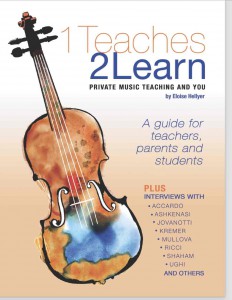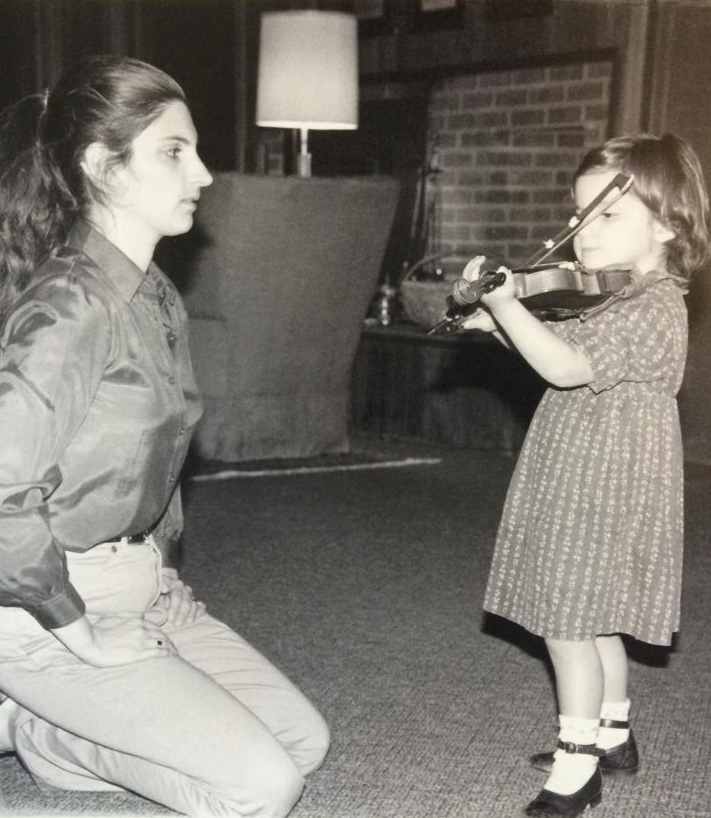Self-Delusion, Self-Deception, Avoidance, Your Student and You (you’re outnumbered): Part 1
No one ever said that teaching the violin is easy, Here is yet another reason why and it’s a biggie.
On my last post I made the comment that “self-delusion is very common among violin students.” I have been called on it – a very thoughtful violin teacher asked my opinion on what causes it. “Perhaps,” he asks, “it’s something other than a self-preservation instinct or limits due to overall maturity?” And then he gets to his real worry, “And it would be interesting to think about whether some self-delusion training is accidentally or inextricably built into early childhood teaching and parenting.”
Wow. I can certainly understand this last concern – I know he is about to become a father and is most likely worried that he might unknowingly scar his child for life – a concern all good parents have, in my experience with lots of them. And good teachers.
The answer is, no, we are not ruining our kids, turning them into self-deluding-head-in-the-sand ostriches. They are doing a nice job of it all by themselves. You see, apparently self delusion, self-deception and avoidance are hardwired into our brains (our hardware) and into our personalities (our software) on many levels. Our brains are deceiving us. So are our egos, AKA, our personalities.
First, let’s define terms. I have been all over the internet trying to find the difference between self-delusion and self-deception. While psychiatrists make some distinctions, psychologists make others, and yet many others say it’s the same thing. So, somewhat perplexed, I decided to go straight to an excellent source, a friend who happens to be a well known psychiatrist* (doesn’t everyone in this profession need a psychiatrist friend?), who concurred that they’re pretty much the same thing. Therefore, for the purposes of clarity, let’s say that self-delusion and self-deception are the same and I will use them interchangeably as do some articles I have read. And for the sake of brevity, let’s just say that self-delusion or self-deception is allowing yourself to believe something that isn’t true.¹
Avoidance is a mechanism we use to avoid pain. In fact Wikipedia (the footnote gives the academic sources) defines avoidance or avoidant coping as:
a maladaptive coping mechanism characterized by the effort to avoid dealing with a stressor. Coping refers to behaviors that attempt to protect oneself from psychological damage²
Students do this all the time: to avoid the pain of admitting they played a wrong or out of tune note, they pretend they don’t hear it, hoping (in vain) that you don’t, so they can also avoid the stress and pain of having to try to fix the problem.
Back to my worried father/teacher. I can see why he would ask if parenting and early education are somehow to blame. In the past, there has been so much worrying about building up children’s self-esteem that it may have given some of our young people the idea that they are God’s gift to the world. Even now much weight is given to the appearance of success, instead of actual accomplishment for the sake of doing something well – or just to be a better person. Instead of precise and specific praise and criticism aimed at helping children improve themselves and be of use to others, it’s often much easier for teachers and parents to praise them, build them up, tell them how intelligent and talented they are without teaching them in a healthy way how to pay attention to their mistakes and thus avoid self-delusion.
But there are those who say that a little self-delusion is a good thing as it helps prevent depression. Constantly facing the awful truth about everything would put all of us in the dumps.
In fact, I read various tracts that the most realistic people are also the most depressed.
Interestingly, the clinically depressed seem less susceptible to these basic cognitive errors. For instance, healthy people can be deluded into greater happiness when granted the mere illusion of control over their environment; the clinically depressed recognize the illusion for what it is. All in all, it’s yet more evidence that unhappy people have the more accurate view of reality — and that learning how to kid ourselves may be a key to mental health.³
And
The mind can protect itself against anxiety by diminishing awareness. This mechanism produces a blind spot: a zone of blocked attention and self-deception. Such blind spots occur at each major level of behaviour from the psychological to the social. .∞
And
“Self-deception is a psychological immune system, but instead of attacking germs like the body’s immune system does, it helps us stave off things that cause us to be unsuccessful in life, like depression. We have a built-in way of looking at the world, rose-colored glasses, that ultimately is very helpful.” ¤
Yes, unless you’re a violin student who wants to improve. Or you’re a violin teacher who wants her students to improve…
So here are our students struggling valiantly to be mentally healthy and we have to bring them back to face reality of their peccadilloes and help them to change their ways without driving any of them to despair. A delicate balance, to be sure. What to do?
It looks like the odds are certainly stacked against us. We are teaching perhaps the most difficult thing there is to do on the planet and instead of getting cooperation, every fiber of the student’s mind and body is fighting against us. And they don’t even know it. We think they know better, but the whole thing is just a defense mechanism against what their brains perceive to be unnecessary, and what their personalities perceive to be pain and stress. Like my colleague mentioned above, it is indeed “a self-preservation instinct” in the sense of preserving the status quo and avoiding change or anything the brain or personality perceives to be unpleasant.
Therefore, I don’t think parenting, society in general or even bad teaching is primarily responsible for self-delusion and avoidance, although these can certainly affirm this self-deception in our students, too. We all have two strikes against us from the start: our brains and our personalities. Learning to play the violin well means conquering both of them and convincing them to do our bidding. Teaching the violin well means helping our students do the same, making students aware that these “defense” mechanism of the brain and personality are what stand between them and playing well.
Of course, this also means making our students realize that we are not our brains and we are not our personalities. But this means we have to realize this ourselves…
As one commenter on my last post said, “Awareness is the first step.” How right she is!
So before we all get too depressed by the reality of our students’ biologically and psychologically based eternal optimism, please know that after this first step of awakening our students’ awareness of their defense mechanisms, there are also some specific problems that music students face that can keep them in self-deception and which we can do something about…
Post author: Eloise Hellyer
* I give her a star instead of a footnote because she deserves many of them for her continuing patience with me. Dr. Zipora Dolev (https://www.drdolev.co.il/english/), who has a seminal new book coming out shortly called “Sleep and Women’s Health”. https://www.crcpress.com/Sleep-and-Womens-Health/Dolev/p/book/9780367322144 Cut and paste as I can’t create a hyperlink to an https// for some reason.
¹https://dictionary.cambridge.org/dictionary/english/self-delusion
²Moshe Zeidner, Norman S. Endler, ed. (1995). Handbook of coping: theory, research, applications. Wiley. p. 514. ISBN 978-0-471-59946-3., ^ Friedman, Howard S.; Silver, Roxane Cohen (2006). Foundations of Health Psychology. New York: Oxford University Press. p. 124. ISBN 978-0-19-513959- Jump up to: Pearlin, LI; Schooler, C (1978). “The structure of coping”. Journal of Health and Social Behavior. (1): 2–21. doi:10.2307/2136319. JSTOR 2136319. PMID 649936.
³Quoted from Stumbling on Happiness by Daniel Gilbert – NY Times Book Review https://www.nytimes.com/2006/05/07/books/review/07stossell.html
∞Vital Lies, Simple Truths, Daniel Goleman, Simon and Schuster, 1986, page 22
¤https://www.inc.com/jessica-stillman/why-a-little-self-delusion-is-a-good-thing.html, quoting Joseph Hallinan author of “Kidding Ourselves:The Hidden Power or Self-Deception”
Share this:
Buy it on www.sharmusic.com - eBook format, avaliable worldwide, paperback in North America
COPYRIGHT
ABOUT
A music teacher’s thoughts and observations on the teaching and the study of a musical instrument, hoping to be of help to parents, students and teachers.
PHOTO
AWARDED TOP 25 VIOLIN BLOG
CATEGORIES
TAGS
ARCHIVES
-
Agosto 2022
Agosto 2023
Agosto 2024
April 2015
April 2016
April 2017
April 2019
April 2020
Aprile 2022
Aprile 2023
Aprile 2024
August 2014
August 2015
August 2016
August 2017
August 2018
August 2019
August 2021
December 2014
December 2015
December 2016
December 2017
December 2018
December 2019
December 2020
Dicembre 2022
Dicembre 2023
Dicembre 2024
Febbraio 2022
Febbraio 2023
Febbraio 2024
February 2015
February 2016
February 2018
February 2019
February 2020
February 2021
Gennaio 2022
Gennaio 2023
Gennaio 2024
Giugno 2022
Giugno 2022
Giugno 2023
Giugno 2024
January 2015
January 2016
January 2017
January 2018
January 2019
January 2020
July 2015
July 2017
July 2019
June 2016
June 2017
June 2018
June 2019
June 2020
June 2021
Luglio 2022
Luglio 2023
Luglio 2024
Maggio 2022
Maggio 2023
Maggio 2024
March 2015
March 2016
March 2017
March 2018
March 2019
March 2020
March 2021
Marzo 2022
Marzo 2023
Marzo 2024
May 2015
May 2016
May 2018
May 2019
May 2020
November 2014
November 2015
November 2016
November 2017
November 2018
November 2019
November 2021
Novembre 2022
Novembre 2023
Novembre 2024
October 2014
October 2015
October 2017
October 2018
October 2019
October 2020
October 2021
Ottobre 2022
Ottobre 2023
Ottobre 2024
September 2014
September 2015
September 2016
September 2018
September 2019
September 2020
September 2021
Settembre 2022
Settembre 2023
Settembre 2024
RECENT POSTS
Terry G and Me, or Terry Gilliam on Where (or What) Practicing the Piano Will Get You…
The Teaching We Don’t Do Is More Important Than We Think
Overwhelmingness or What Teaching and Motherhood* Have in Common
Cellphone Serenity
How to Build Your Reputation – the Kind You Want
Desperate Times, Desperate Measures. Or How to Deal With Your Strong-Willed Stubborn Student and Survive
“Why Does My Teacher Get So Frustrated?” Letter to a Perplexed Student
Mount Rush-no-more….And How to Get There
Realizzato con VelociBuilder - Another Project By: Marketing:Start! - Privacy Policy




